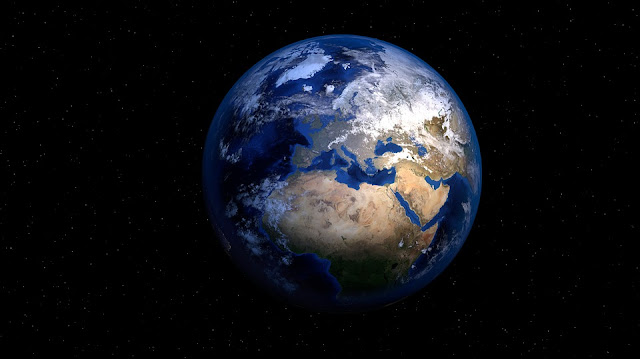welcome to top6thing.blogspot.com we think we know everything about our home planet, but we could not be more wrong scientists have already discovered a lot about the universe, but they believe there is still much more to learn about our planet.
Top 6 Amazing Facts about Earth.
Earth profile:
Distance from sun: 149.6 million km
Radius: 6,371 kmAge: 4.5 billion years
Equatorial Diameter: 12,756 km
Polar Diameter: 12,714 km
Orbit Period: 365.24 days
Facts about Earth:
1. A Real Earth Day:
You may assume you've been spending your life enjoying full 24-hour days here on Earth, but you know what they say about assuming. In actuality, your days fall short of 24- hours, with a full rotation occurring within 23 hours, 56 minutes and 4.1 seconds. If you think about it, our current method of daily cycling adds about 1,460 minutes a year. So, who's to blame for the additional time each day? The 24-hour clock can be traced back to ancient Egypt, which divided the day into 10 hours of a day, 12 hours of the night, with one hour added at twilight and one at the end of the day.
2. Distance from the Sun:
Being only the 3rd rock from the sun, one would think Earth is pretty close to that giant, glowing, celestial orb right? . In fact, at our closest, we're a hefty 92.95 million miles or 149.6 million km away from the sun. There's also quite a bit of a leap from Earth to the next farthest planet of Mars, at its closest, is an additional 36 million miles or 57 million km away.
Also Read. Facts about the Sun
. Facts about the Moon
. Facts about Mars
3. The Many Quakes of Earth:
We're no strangers to hearing about quakes all over the globe. From the calmer trembling of the Earth's crust to the far move devastating quakes, as a whole, we probably knowingly experience several dozen a year. According to the National Earthquake Information Centre, what we're feeling is just the tip of the iceberg - and the United States Geological survey thinks it's even more drastic than the NEIC States. According to the NEIC, approximately 50 earthquakes a day are recorded, or around 18,000 a year. The USGS claims that there are several million each year, with so many going undetected either because they're in remote areas or due to their very small magnitudes.
4. How Deep Does it Go?
Holes have popped up all over the Earth's surface and some have even been at the behest of Russian scientists experiments - but there's one natural point that goes far beyond any known cave, valley, or canyon. The Mariana Trench, located in the western Pacific Ocean, just east of the Mariana islands, reaches a depth of 36,070 feet or 10,994 meters below sea level. Expeditions in 1960 and 2012 were the only successful attempts at reaching the bottom of the trench and, no, neither found the illusive megalodon. On land, the deepest point is an artificial hole started in the 1970s. After 19 years of attempts and drilling, the Lola superhero Borehole reached a depth of 40,230 feet or 12,262 meters.
5. Is Earth Really That Unique?
Quite often we hear about how different Earth is when compared to other people planets in the Milky Way, but is Earth really all that unique? In reality, there have been discoveries of other planets many, many light years away of planets that are quite similar to our precious blue sphere. In September of 2010, a planet is known as planet G, or Gliese 581g, in the Gliese 581 system was located. Planet G is said to be able to support life, similar to that found on Earth. Unfortunately, current technology limit knowledge on just how similar to Earth Planet G really is, but the potential is there.
6. An Ungodly Naming:
As we've gone through the solar system, chances are you noticed the trend when it comes to their names. They're pretty much all named after a Roman or Grecian God. All of them, of course, except for Earth. Our little planets moniker is believed to stem from the Indo- European "er", with routes in the Germanic and Anglo- Saxon "erde" and "erda" , along with the proto-Germanic root of "erpo" . In Germanic paganism, Earth was a goddess that paralleled the Roman Terra and Grecian Gaia, so while it may not have been directly named after a god or goddess, it still can be connected to one.






0 Comments